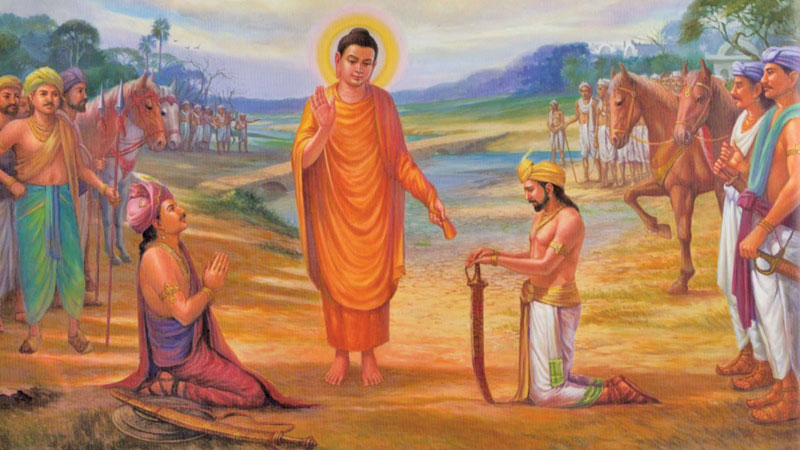
Lord Buddha had gone beyond all worldly affairs but still gave advice on good governance.
The Buddhist approach to political power is the moralization and the responsible use of public power. Lord Buddha preached non-violence and peace as a universal message. He did not approve of violence or the destruction of life, and declared that there is no such thing as a ‘just’ war. He taught: ‘The victor breeds hatred, the defeated lives in misery. He who renounces both victory and defeat is happy and peaceful.’ Not only did the Buddha teach non-violence and peace, He was perhaps the first and only religious teacher who went to the battlefield personally to prevent the outbreak of a war. He diffused tension between the Sakyas and the Koliyas who were about to wage war over distribution rights of the waters of Rohini. He also dissuaded King Ajatasattu from attacking the Kingdom of the Vajjis.
Lord Buddha discussed the importance and the prerequisites of a good government. He showed how the country could become corrupt, degenerate and unhappy when the head of the government becomes corrupt and unjust. He spoke against corruption and how a government should act based on humanitarian principles.
Lord Buddha once said: ‘When the ruler of a country is just and good, the ministers become just and good, when the ministers are just and good, the higher officials become just and good, when the higher officials are just and good, the rank and file become just and good, when the rank and file become just and good, the people become just and good.’
(ANGUTTARA NIKAYA)
In the CAKKAVATTI SIHANADA SUTTA, Lord Buddha said that immorality and crime, such as theft, falsehood, violence, hatred, cruelty, could arise from poverty. Kings and governments may try to suppress crime through punishment, but it is futile to eradicate crimes through force.
In the KUTADANTA SUTTA, Lord Buddha suggested economic development instead of force to reduce crime. The government should use the country’s resources to improve the economic conditions of the country. It could embark on agricultural and rural development, provide financial support to those who undertake an enterprise and business, provide adequate wages for workers to maintain a decent life with human dignity.
In the JATAKA stories, Lord Buddha gave 10 rules for Good Government, known as Dasa Raja Dharma. These ten rules can be applied even today by any government which wishes to rule the country peacefully. According to these rules a ruler must:
1. Be liberal and avoid selfishness,
2. Maintain a high moral character,
3. Be prepared to sacrifice his own pleasure for the well being of the subjects,
4. Be honest and maintain absolute integrity,
5. Be kind and gentle,
6. Lead a simple life for the subjects to emulate,
7. Be free from hatred of any kind,
8. Exercise non violence,
9. Practice patience, and
10. Respect public opinion to promote peace and harmony.
Regarding the behavior of rulers, He further advised:
1. A good ruler should act impartially and should not be biased and discriminate between one particular group of subjects against another.
2. A good ruler should not harbour any form of hatred against any of his subjects.
3. A good ruler should show no fear whatsoever in the enforcement of the law, if it is justifiable.
4. A good ruler must possess a clear understanding of the law to be enforced. It should not be enforced just because the ruler has the authority to enforce the law. It must be done in a reasonable manner and with common sense. (CAKKAVATTI SIHANADA SUTTA)
In the MILINDA PANHA, it is stated: ‘If a man, who is unfit, incompetent, immoral, improper, unable and unworthy of kingship, has enthroned himself a king or a ruler with great authority, he is subject to a variety of punishment by the people, because, being unfit and unworthy, he has placed himself unrighteously in the seat of sovereignty. The ruler, like others who violate and transgress moral codes and basic rules of all social laws of mankind, is equally subject to punishment; and moreover, to be censured is the ruler who conducts himself as a robber of the public.’ In a Jataka story, it is mentioned that a ruler who punishes innocent people and does not punish the culprit is not suitable to rule a country.
The king always improves himself and carefully examines his own conduct in deeds, words and thoughts, trying to discover and listen to public opinion as to whether or not he had been guilty of any faults and mistakes in ruling the kingdom. If it is found that he rules unrighteously, the public will complain that they are ruined by the wicked ruler with unjust treatment, punishment, taxation, or other oppressions including corruption of any kind, and they will react against him in one way or another. On the contrary, if he rules righteously they will bless him: ‘Long live His Majesty.’ (MAJJHIMA NIKAYA)
(Extracted from “What Buddhists Believe” by Most Venerable Dr. K. Sri Dhammananda)



Add new comment